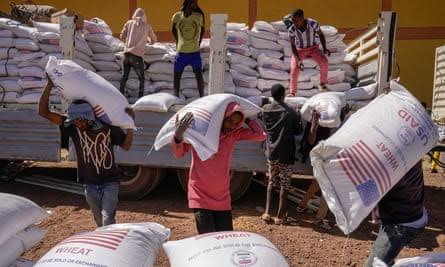In a recent development, the Ethiopian government has strongly criticized the suspension of food aid to the country by the United States and the UN World Food Program (WFP).
The government’s spokesman, Legesse Tulu, labeled the decision as “political” and expressed concern that it would have a severe impact on millions of people who rely on food assistance.
It is estimated that over 15% of Ethiopia’s population depends on such aid.
The suspension was initially announced on Thursday by the United States Agency for International Development (USAID), the government’s international aid agency. USAID denounced a “widespread and coordinated detour operation” as the reason behind its decision to halt food aid.
Following suit, the WFP declared the “temporary suspension of food aid” on the subsequent day, also citing concerns of food diversion.
However, the organization affirmed its commitment to providing vital nutritional assistance to vulnerable groups such as children, pregnant and lactating women, as well as supporting school meal programs and initiatives to strengthen farmers and herders in the face of external shocks.
Government spokesman Legesse Tulu voiced his strong objections during a press conference, stating that the suspension unfairly “punishes millions of people.”
He further emphasized that holding only the government accountable for any embezzlement was unacceptable.
Earlier in May, both USAID and the WFP had already decided to suspend food aid to the Tigray region of Ethiopia due to the diversion of aid supplies being sold on the local market.
The Ethiopian authorities, in collaboration with USAID, assured the public that a joint investigation was underway to identify those responsible for the embezzlement.
According to estimates by the United Nations humanitarian agency (Ocha), approximately 20 million people, constituting 16% of Ethiopia’s 120 million inhabitants, rely on food aid.
The dire situation is attributed to the ongoing conflict and a historic drought in the Horn of Africa, which has resulted in the displacement of 4.6 million individuals across the country.
Apart from these challenges, Ethiopia also accommodates nearly a million refugees, primarily from South Sudan, Somalia, and Eritrea.
The recent influx of approximately 30,000 people seeking refuge from the conflict in Sudan has added to the strain on resources in eastern Ethiopia since mid-April.












